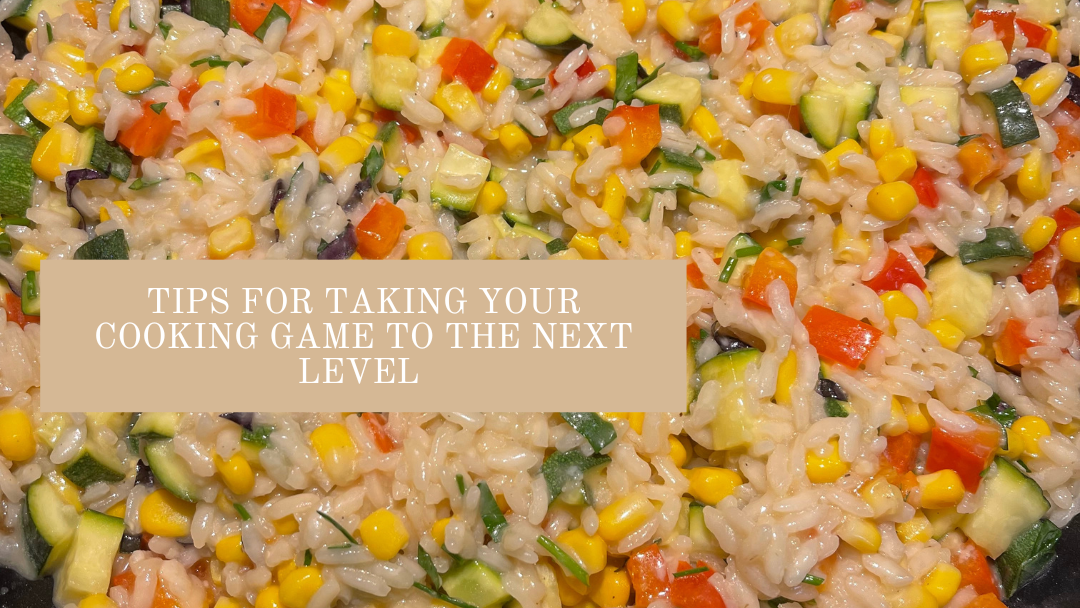Tips for Taking Your Cooking Game to the Next Level

As I get older I think cooking is becoming my favorite past time. I honestly love creating new, delicious and nourishing meals for me and my family. When I got into junior high, I stopped watching cartoons and Disney channel after school and started watching the Food Network. My afternoons were spent with Giada De Laurentiis, Rachel Ray, and Ina Garten. I used to be so in awe of how they minced fresh garlic cloves and sprinkled fresh herbs into their dishes. I used to think “I’ll know I’m an adult when I use herbs.” To this day, I get a sort of euphoria cutting herbs out of my garden and using them in my food.
Not only do I enjoy cooking, I’ve been told by my family and friends that I’m really good at it. I’ve learned a lot over the years, mostly from binge watching Chopped. So today I wanted to share some of my favorite tips for elevating your everyday meals. These tricks never fail me, and I hope you learn something new!
Use Fresh Herbs
I alluded to this earlier, but using fresh herbs is the easiest way to elevate your cooking game. Take the time to learn about each herb: what it pairs well with, what kinds of cuisine you’ll find it in, what it tastes like. For example, parsley is often found in Mediterranean cuisine. I always think of lemon, artichokes, olives, feta and salmon when I think of parsley. It is also a natural diuretic and can help reduce bloating and blood pressure. I eat a lot of parsley around my time of the month because of it’s de-bloating benefits.
Herbs aren’t just a garnish. You can add them at any point in the cooking process. I love marinating my steak for tacos with fresh cilantro, and throwing some whole basil leaves in my vodka pasta sauce as it reduces. The perks of using herbs as a garnish is that you really get to taste it in its natural state. You’ll see how it compliments your food. The trick to anything, especially herbs, is start small. You can always add more, but it’s usually troublesome to take them out.
Season Every Step of the Way
This is something I definitely learned from Food Network: season your food every step of the way. If you want to build really deep and dynamic flavor then you need to season. Salt naturally brings out flavor. You add it in baking to bring out the natural sweetness of the ingredients. For savory cooking, you need to add more to take away sweetness and highlight umami. Umami is a Japanese word that describes one of the 5 flavor categories. The other four are sweet, sour, bitter and salt. Umami can be described as savory or complex. It is quite literally what makes you want to take another bite.
Say you are cooking chicken noodle soup. You’ll start with a mirepoix: carrots, celery, onion. Season that with salt and pepper. Then you add your chicken broth. That will need to be seasoned with salt as well. When you add your noodles, season again. So on, and so forth. Your soup will taste like it’s been simmering for hours instead of 30 minutes.
Add Acidity
In my opinion, the flavor profile that gets forgotten most often is acidity. If your food tastes kind of one note, add acidity. It will instantly brighten your dish and make your palette tingle. Acidity isn’t just citrus fruits, although those are some of my favorite ingredients to use, it’s also wine and vinegar. Deglazing the pan with white wine while making risotto will give you a fruity and bright flavor in the final dish. Adding a pickled element such as kimchi, pickled vegetables, or a vinaigrette will have the same effect as a squeeze of lemon. Sometimes, especially with Chinese cuisine, I don’t know what citrus fruit would pair best. So I usually sub my citrus for rice wine vinegar. I personally love a really assertive bite of acid, but again, start small if you’re not used to the bold flavor.
Taste Your Food Before Serving
I always have a tasting spoon next to my stove. Even if I’m only cooking for Scott, I want to make sure my food is at it’s highest quality. If something is missing my first move is to add more salt. Is that the healthiest option? Probably not, but 9 times out of 10 it boosts the flavor of my food. If salt doesn’t work then I usually opt for acidity. Going back to our chicken noodle soup, I love simmering my soup with a halved lemon. If my Chinese brown sauce isn’t dynamic enough I add hoisin sauce or Worcestershire to give me more umami. The number one rule for leveling up your cooking is not being afraid of trying new things. I may have learned a lot from Chopped, but I’ve learned even more by trying new things.
Let me know if you need any more tips or if you have more recipes you’d like to see that highlight the 5 flavor profiles. You can always find more food content over on Instagram @oliviajoehl.
